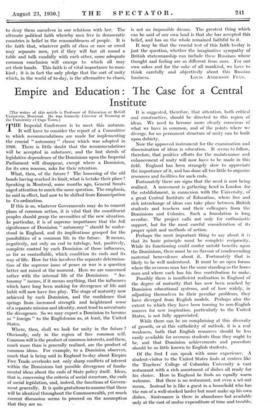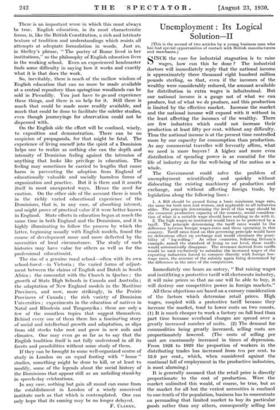Empire and Education : The Case for a Central
Institute
[Tho writer of this article is Professor of Education at McGill University, Montreal. He was formerly Director of Training at the University cf Cape Town.]
THE Imperial Conference is to meet this autumn. It will have to consider the report of a Committee in which recommendations are made for implementing the crucial " autonomy " clause which was adopted in 1926. There is little doubt that the recommendations will be accepted in substance, and the laSt shreds of legislative dependence of the Dominions upon the Imperial Parliament will disappear, except where a Dominion, for its own reasons, asks for their retention.
What, then, of the future ? The loosening of the old bonds having reached its limit, what is to take their place? Speaking in Montreal, some months ago, General Smuts urged attention to much the same question. The emphasis, he said in effect, had now to be shifted from Emancipation to Co-ordination.
If this is so, whatever Governments may do to concert plans of common action, it is vital that the constituent peoples should grasp the necessities of the new situation. In particular, it is of supreme importance that the full significance of Dominion " autonomy " should be under- stood in England, and its implications grasped for the possibilities of a common life in the future. It means, negatively, not only an end to tutelage, but, positively, complete control by each Dominion of those influences, so far as controllable, which condition its ends and its way of life. How far this involves the separate determina- tion of the supreme issue of peace or war is a question better not raised at the moment. Here we are concerned rather with the internal life of the DominiOnS. " Au- tonomy " means, if it means anything, that the influences which have long been making for divergence of life and habit will now have free play. The stage of maturity now achieved by each Dominion, and the confidence that springs from increased strength and heightened sense of a separate mission and identity, must tend to accentuate the divergence. So we may expect a Dominion to become as " foreign" to the Englishman as, at least, the United States.
Where, then, shall we look for unity in the future ? Obviously, only in the region of free common will. Common will is the product of common interests, and these, much more than is generally realized, are the product of common ideas. For example, to a Dominion observer, much that is being said in England to-day about Empire Free Trade overlooks not only sharp conflicts of interest within the Dominions but possible divergence of funda- mental ideas about the ends of State policy itself. Ideas, that is, concerning the criteria of social structure, the ends of social legislation, and, indeed, the functions of Govern- ment generally. It is quite gratuitous to assume that these will be identical throughout the Commonwealth, yet much current discussion seems to proceed on the assumption that they are so.
It is suggested, therefore, that attention, both critical and constructive, should be directed to this region of ideas. We need to become more clearly conscious of what we have in common, and of the points where we diverge, for no permanent structure of unity can be built upon dubiety.
Now the approved instrument for the examination and dissemination of ideas is education. It seems to follow, therefore, that positive efforts for the maintenance and enhancement of unity will now have to be made in this field. England has been strangely slow to appreciate the importance of it, and has done all too little to organize resources and facilities for such ends.
Fortunately there are signs that the need is now being realized. A movement is gathering head in London for the establishment, in connexion with the University, of a great Central Institute of Education, where free and rich interchange of ideas can take place between British students and teachers and their colleagues front the Dominions and Colonies. Such a foundation is long overdue. The project calls not only for enthusiastic support, but for the most careful consideration of its proper spirit and methods of action.
Perhaps the most important thing to say about it is that its basic principle must be complete reciprocity. While its functioning could confer untold benefits upon the Dominions, there must be no flavour of condescending maternal benevolence about it. Fortunately that is likely to be well understood. It must be an open forum where the overseas man has the same standing as the home man and where each has his free contribution to make.
Possibly there is insufficient realization in England of the degree of maturity that has now been reached by Dominion educational systems, and of how widely, in adjusting themselves to their peculiar problems, they have diverged from English models. Perhaps also the extent to which they have been turning to non-English sources for new inspiration, particularly to the United States, is not fully appreciated.
While there can be no complaining at this diversity of growth, or at this catholicity of outlook, it is a real weakness, both that English resources should be less easily available for overseas students than they ought to be, and that Dominion achievements and procedure should be so little known to English students.
Of the first I can speak with some experience. A student-visitor to the United States finds at centres like the Teachers' College of Columbia University a vast restaurant with a rich assortment of dishes all ready for his choice. Here in England he finds an equally warm welcome. But there is no restaurant, not even a set-out menu. Instead he is like a guest in a household who has the run of a well-stocked larder but must make up his own dishes. • Sustenance is there in abundance but available only at the cost of undue expenditure of time and trouble. There is an important sense in which this must always be true. English education, in its most characteristic forms, is, like the British Constitution, a rich and intricate texture of tradition and understandings which resists all attempts at adequate formulation in words. Just as, in Shelley's phrase, " The poetry of Rome lived in her institutions," so the philosophy of English education lives in the working school. Even an experienced headmaster finds some difficulty in saying how it works and exactly what it is that does the work.
So, inevitably, there is much of the mellow wisdom of English education that can no more be made available at a central repository than springtime woodlands can be sold in Piccadilly. You just have to go and experience these things, and there is no help for it. Still there is much that could be made more readily available, and much that could be done to facilitate the subtler studies, even though joumeyings for observation could not be dispensed with.
On the English side the effort will be confined, wisely, to exposition and demonstration. There can be no suspicion of propaganda, for that might be fatal. The experience of living oneself into the spirit of a Dominion helps one to realize as nothing else can the depth and intensity of Dominion feeling against the intrusion of anything that looks like privilege in education. The feeling may sometimes be carried to lengths that cause harm in preventing the adoption from England of educationally valuable and socially harmless forms of organization and practice. But it is there and it asserts itself in most unexpected ways. Hence the need for caution. On the other side of the account there is much in the richly varied educational experience of the Dominions, that is, in any case, of absorbing interest, and might prove of practical value if it were better known in England. State efforts in education began at much the same time in both England and the Dominions, and it is highly illuminating to follow the process by which the latter, beginning usually with English models, found the course of development more and more deflected by the necessities of local circumstance. The study of such histories may have value for others as well as for the professional educationist.
The rise of a genuine rural school—often with its own school-forest—in Victoria ; the varied forms of adjust- ment between the claims of English and Dutch in South Africa ; the concordat with the Church in Quebec ; the growth of State High Schools in Canada and Australia ; the adaptation of New England models in the Maritime Provinces, and now, more strikingly, in the Prairie Provinces of Canada ; the rich variety of Dominion Universities ; experiments in the education of natives in Natal and Rhodesia and Tanganyika ; these are only a few of the countless topics that suggest themselves. Behind every one of them there lies a fascinating story of social and intellectual growth and adaptation, as slips from old stocks take root and grow in new soils and climates. One may even go so far as to say that the English tradition itself is not fully understood in all its facets and possibilities without some study of them.
If they can be brought to some well-organized centre of study in London on an equal footing with " home " studies, something might be done to kill, or at least to modify, some of the legends about the social history of the Dominions that appear still as an unfailing stand-by in speech-day celebrations.
In any case, nothing but gain all round can come from the establishment in London of a wisely conceived institute such as that which is contemplated. One can only hope that its coming may be no longer delayed.
F. CLARKE.

































 Previous page
Previous page